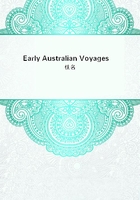
第27章
On the 27th, being in the latitude of 2 degrees 10 minutes south, and in the longitude of 146 degrees 57 minutes, we fancied that we had a sight of the island of Moa, but it proved to be that of Jama, which lies a little to the east of Moa. We found here great plenty of cocoa-nuts and other refreshments. The inhabitants were absolutely black, and could easily repeat the words that they heard others speak, which shows their own to be a very copious language.
It is, however, exceedingly difficult to pronounce, because they make frequent use of the letter R, and sometimes to such a degree that it occurs twice or thrice in the same word. The next day we anchored on the coast of the island of Moa, where we likewise found abundance of refreshments, and where we were obliged by bad weather to stay till May 9th. We purchased there, by way of exchange, six thousand cocoa-nuts, and a hundred bags of pysanghs or Indian figs.
When we first began to trade with these people, one of our seamen was wounded by an arrow that one of the natives let fly, either through malice or inadvertency. We were at that very juncture endeavouring to bring our ships close to the shore, which so terrified these islanders, that they brought of their own accord on board us, the man who had shot the arrow and left him at our mercy.
We found them after this accident much more tractable than before in every respect. Our sailors, therefore, pulled off the iron hoops from some of the old water-casks, stuck them into wooden handles, and filing them to an edge, sold these awkward knives to the inhabitants for their fruits.
In all probability they had not forgot what happened to our people on July 16th, 1616, in the days of William Schovten: these people, it seems, treated him very ill; upon which James le Maire brought his ship close to the shore, and fired a broadside through the woods; the bullets, flying through the trees, struck the negroes with such a panic, that they fled in an instant up into the country, and durst not show their heads again till they had made full satisfaction for what was past, and thereby secured their safety for the time to come; and he traded with them afterwards very peaceably, and with mutual satisfaction.
This account of our author's seems to have been taken upon memory, and is not very exact. Schovten's seamen, or rather the petty officer who commanded his long boat, insulted the natives grossly before they offered any injury to his people; and then, notwithstanding they fired upon them with small arms, the islanders obliged them to retreat; so that they were forced to bring the great guns to bear upon the island before they could reduce them. These people do not deserve to be treated as savages, because Schovten acknowledges that they had been engaged in commerce with the Spaniards; as appeared by their having iron pots, glass beads, and pendants, with other European commodities, before he came thither.
He also tells us that they were a very civilised people, their country well cultivated and very fruitful; that they had a great many boats, and other small craft, which they navigated with great dexterity. He adds also, that they gave him a very distinct account of the neighbouring islands, and that they solicited him to fire upon the Arimoans, with whom it seems they are always at war; which, however, he refused to do, unless provoked to it by some injury offered by those people. It is therefore very apparent that the inhabitants of Moa are a people with whom any Europeans, settled in their neighbourhood, might without any difficulty settle a commerce, and receive considerable assistance from them in making discoveries.
But perhaps some nations are fitter for these kind of expeditions than others, as being less apt to make use of their artillery and small arms upon every little dispute; for as the inhabitants of Moa are well enough acquainted with the superiority which the Europeans have over them, it cannot be supposed that they will ever hazard their total destruction by committing any gross act of cruelty upon strangers who visit their coast; and it is certainly very unfair to treat people as savages and barbarians, merely for defending themselves when insulted or attacked without cause. The instance Captain Tasman gives us of their delivering up the man who wounded his sailor is a plain proof of this; and as to the diffidence and suspicion which some later voyagers have complained of with respect to the inhabitants of this island, they must certainly be the effects of the bad behaviour of such Europeans as this nation have hitherto dealt with, and would be effectually removed, if ever they had a settled experience of a contrary conduct. The surest method of teaching people to behave honestly towards us is to behave friendly and honestly towards them, and then there is no great reason to fear, that such as give evident proofs of capacity and civility in the common affairs of life should be guilty of treachery that must turn to their own disadvantage.